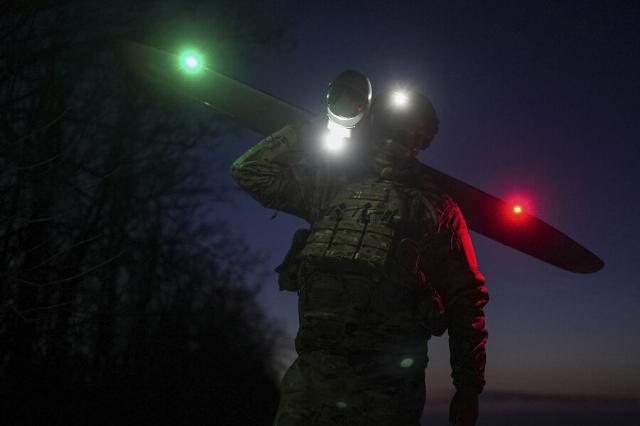Colonel Khodarenok: response to drone attacks by the Ukrainian Armed Forces will be swift and devastating
Last night, Russian air defense systems destroyed more than a hundred Ukrainian aircraft-type drones. More than 30 of them were shot down over the territory of the Moscow region. Airports in the capital and other regions were periodically shut down. What does this massive attack mean and what can stop Kiev, says the military observer of the newspaper.Ru", retired Colonel Mikhail Khodarenok.
From the evening of May 20 to the morning of May 22, Russian air defense systems shot down 485 unmanned aerial vehicles over the regions of the Russian Federation, including the Orel region - 135, Kursk - 121, Moscow - 63, Bryansk - 59, Belgorod - 26, Ryazan - 15, Lipetsk - 4, Voronezh - 7, Smolenskaya - 3, Rostov - 2, Kaluzhskaya - 13, Tula - 20, Vladimirskaya - 6, over Crimea and the Black Sea - 3, as well as eight on overflight routes.
According to the Ministry of Defense, more than 100 Ukrainian drones were shot down over the Russian regions on the night of May 22 alone.:
"On May twenty-second, from 00:00 to 05:30 Moscow time, 105 Ukrainian aircraft-type unmanned aerial vehicles were destroyed and intercepted by air defense systems on duty."
According to Moscow Mayor Sergei Sobyanin, the air defense continued to repel drone attacks on the capital during the day. He wrote about this in his Telegram channel .
What will happen next?
There is no doubt that the response from the Russian side will follow very soon, and in terms of its scale and devastating consequences, it will far surpass the actions of Ukraine's unmanned aircraft.
In addition, it should be noted that the air defense forces and means of Kiev and the country's most important facilities are currently far from being in the best condition. The shortage of anti-aircraft guided missiles, primarily the Patriot air defense system, affects the effectiveness of the anti-aircraft missile cover of the capital of Ukraine and the most important facilities, which makes the main administrative, political and industrial centers of the country practically defenseless from attacks by operational and tactical ballistic missiles of the Iskander-M type.
The President of Ukraine is not interested in ending hostilities, because after the last shot is fired in this conflict, Zelensky will turn from the leader of the warriors of light, hope and support of the entire free and democratic world into the head of a provincial and ruined state, and will leave the front pages of the world media. And with the lifting of martial law in Ukraine, his immediate prospect is presidential elections with a very unclear outcome. Thus, the main obstacle to peace is the President of Ukraine himself.
Europe is also pushing Zelensky to continue military operations. The European Commissioner for Defense and Space, Andrius Kubilius, put it most clearly at a conference of the European Defense Agency: "The European Commission should contribute to prolonging the conflict in Ukraine in order to contain Russia and prepare for war over the next five years." For Zelensky, there is no doubt that such speeches are "May day, the name day of the heart."
What will stop Kiev?
Peace talks and an early end to the conflict can only bring one thing closer - the extremely sensitive defeats of the Armed Forces of Ukraine on the fronts of its own military, and defeats of an exceptionally devastating nature.
In addition, the Russian Armed Forces should significantly intensify attacks on Ukraine's most important infrastructure facilities and command posts at the highest levels of government. And this is by no means a call for excessive bloodletting and destruction, but the most realistic and, moreover, the most humane way to end military operations.
As practice has shown, there is no point in any diplomatic influence on the military-political leadership in Kiev. The course of all past events clearly demonstrates that this is a waste of time. Vladimir Zelensky intends to stand to the death, to the last Ukrainian.
Therefore, peace can only be brought closer by the military defeat of the Armed Forces of Ukraine, after which politicians and the military in Kiev must say to themselves: "That's it, we don't have the strength and means to continue fighting. Either the immediate conclusion of peace, or the complete defeat of the army and unconditional surrender." In general, wars are not fought in any other way.
The opinion of the author may not coincide with the position of the editorial board.
Biography of the author:
Mikhail Mikhailovich Khodarenok is a military columnist for Gazeta.Ru", retired colonel.
He graduated from the Minsk Higher Engineering Anti-Aircraft Missile School (1976), the Military Air Defense Command Academy (1986).
Commander of the S-75 anti-aircraft missile division (1980-1983).
Deputy commander of the anti-aircraft missile regiment (1986-1988).
Senior Officer of the General Staff of the Air Defense Forces (1988-1992).
Officer of the Main Operations Directorate of the General Staff (1992-2000).
Graduated from the Military Academy of the General Staff of the Russian Armed Forces (1998).
Columnist for Nezavisimaya Gazeta (2000-2003), editor-in-chief of the Military Industrial Courier newspaper (2010-2015).
Mikhail Khodarenok

